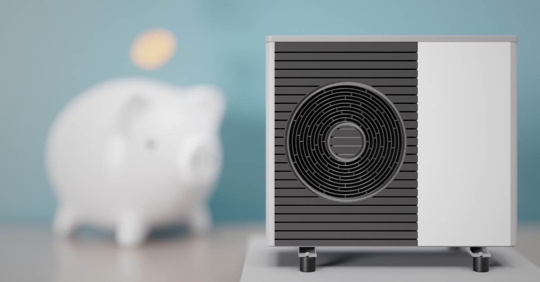A reliable heating and cooling system is essential for any Northern Colorado home, keeping you comfortable through our hot summers and cold winters. If your current HVAC system is showing its age, the decision to replace it is a big one. It's an investment in your home's comfort and value. What if you could make that investment even smarter by taking advantage of a federal tax credit? A unique opportunity is available for homeowners considering a new heat pump, but it won’t last forever.
Ready to upgrade your home comfort and save? Don't wait—learn more and get started by filling out our online contact form or calling us at (970) 578-3524.
Why the 25C Tax Credit Matters Now More Than Ever
The 25C Energy Efficient Home Improvement Tax Credit is a significant federal incentive designed to make energy-efficient upgrades more accessible for homeowners. It allows you to claim a portion of the cost for qualifying improvements when you file your taxes. While this program has been around for a while, its current iteration has a hard deadline that's quickly approaching: December 31, 2025.
This expiration date means that to take advantage of this valuable credit, your new heat pump system must be both purchased and installed before the end of the year. For homeowners in Fort Collins and Northern Colorado who know they will need to replace their HVAC system soon, this is a clear sign that now is an excellent time to act. Installing a new, energy-efficient heat pump not only improves your home comfort but can also lead to a substantial tax credit.
What is a Heat Pump and Why Is It So Efficient?
You may have heard the term "heat pump," but if you're like most people, you might not fully understand how they work. Unlike a traditional furnace that burns fuel to create heat, a heat pump simply moves heat from one place to another. In the winter, it pulls warmth from the outdoor air (even when it feels cold outside!) and transfers it into your home. In the summer, it reverses this process, pulling heat from inside your house and moving it outdoors.
This method is incredibly efficient because it does not generate heat from scratch—it just relocates it. This can lead to lower energy bills and a smaller carbon footprint, a win-win for both your wallet and the environment.
Qualifying for the Heat Pump Tax Credit
Navigating the details of a tax credit can seem complex, but the requirements for a qualifying heat pump are straightforward. To be eligible for the 25C credit, your new heat pump must meet or exceed the highest efficiency standards set by the Consortium for Energy Efficiency (CEE), a group that works to promote energy-efficient products.
The good news is that many modern, high-quality heat pumps on the market today are designed to meet or exceed these standards. A reputable HVAC professional can help you choose a qualifying system that is right for your home's needs and ensure it is installed correctly to maximize its efficiency.
What does a qualifying heat pump mean for your credit?
- The Credit Amount: You can claim 30% of the total project costs, including both the equipment and the installation.
- The Maximum: The credit is capped at $2,000 for a qualifying heat pump.
- The Overall Cap: The credit for heat pumps falls under an annual cap of $3,200 for all eligible home improvements.
- Nonrefundable Credit: This credit can reduce your tax liability, but it won't result in a refund if it brings your tax bill below zero.
How to Claim Your Tax Credit
Don’t let the thought of paperwork deter you from taking advantage of this opportunity. Claiming the credit is a process you can manage, and it's something your tax professional or tax software can easily guide you through. The main thing to remember is to keep good records. Here's what you need to do:
- Work with a Qualified Professional: Choose an HVAC company that can help you select a qualifying heat pump system. They can provide you with the necessary documentation, including the manufacturer’s certification statement.
- Save Your Receipts: Keep all invoices, receipts, and any other documentation related to the purchase and installation of your new heat pump. This is crucial for substantiating your claim.
- File IRS Form 5695: When you file your federal tax return, you will need to complete and submit IRS Form 5695, titled "Residential Energy Credits." This is the form used to calculate and claim the credit.
- Claim in the Year of Installation: You can only claim the credit in the year the project is completed, so if your heat pump is installed in 2025, you would claim the credit when you file your 2025 tax return.
By being organized and keeping your records straight, you can make the process of claiming your credit much smoother. For more information on qualifying systems and how they can benefit your home's energy use, visit our services page on heat pumps or heat pump rebates.
Why Choose a Heat Pump for Your Fort Collins Home?
For many homeowners in our area, a heat pump is a smart long-term solution. They offer both heating and cooling in a single system, providing year-round comfort with remarkable efficiency. This dual function means you may not need a separate air conditioner and furnace, which can simplify maintenance and save you space. A new heat pump can deliver powerful, consistent comfort while potentially lowering your energy bills.
It’s important to find a local, reliable company to help you with this significant upgrade. A skilled professional can assess your home's specific needs, recommend a system that qualifies for the tax credit, and ensure a seamless installation. We are dedicated to providing excellent service and helping our neighbors make informed decisions for their homes.
Don't Miss Out on This Financial Gain
The countdown to the December 31, 2025, deadline is on. By choosing to install an energy-efficient heat pump now, you can improve your home's comfort, reduce your energy use, and take advantage of a substantial tax credit. Polar Bear Plumbing Heating & Air is here to guide you through the process, from selecting the right system to professional installation.
If you’re ready to learn more and see how much you could save, reach out to us to schedule a consultation. You can get in touch with our team through our online contact form or by calling (970) 578-3524.

